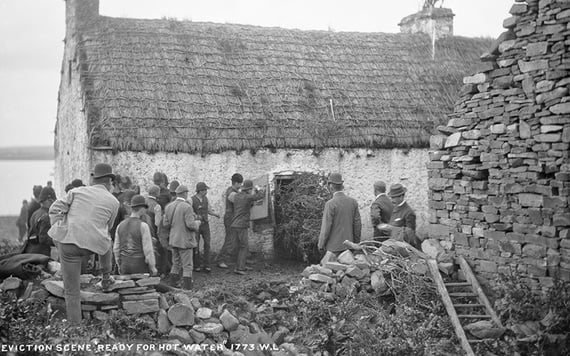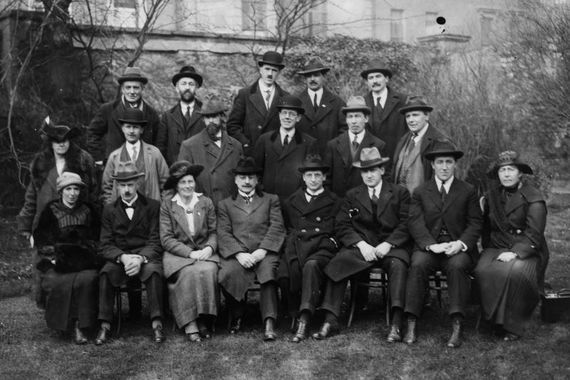Margarite Moore was a fierce Irish patriot, nationalist and activist known as the "first suffragette" but her remarkable story as been sadly forgotten.
Marguerite Moore was born in Waterford 170 years ago on July 7, 1849.
This steadfast lady was to become one of the first members of the Ladies Land League in 1881. This female arm of the Land League took over the responsibility to stop evictions and provide relief for those already evicted while the male leaders of the land movement were languishing in jails.
Moore was known as a powerful orator who traveled the country delivering hearty speeches. She also spread the word of the Land League across Europe and Britain. Just 12 months after the establishment of the Ladies Land League it was banned by the British authorities and Moore was one of 13 members arrested. She refused to recognize the court and was to spend six months in Tullamore Jail.
Read more: Irish invented the boycott because of English land agent who died on this day

An eviction taking place during the Irish Land War. Image: National Library of Ireland.
Moore and her family of two boys and four girls moved to New York in 1884. After the Phoenix Park murders in 1882, the British legal system tried to extradite Moore on the false charges that she supplied the knives used in the murders. The extradition order was refused on the simple fact that Moore was serving her six-month jail sentence in Tullamore!
This is an example of how much the British feared the Waterford lady, that they would rather have her locked up than see her spread the word of the Irish struggle across the world.
In New York, Moore got involved with American land reform. She also got involved in women's suffrage where she spoke at several rallies and meetings. Moore led protests against the excommunication of Fr Edward McGlynn, an Irish American priest who supported land reform and workers' rights. She organized parishioners of St Stephens in New York to withhold their Sunday dues until Fr McGlynn was reinstated. The Vatican relented after two years and Fr McGlynn was reinstated.
Read more: American tourists witnessed ruthless 1880s Irish tenant farmer evictions

Michael Collins and Eamonn De Valera with other early Sinn Féin members.
In America, Moore continued her support for Irish matters and spoke at numerous Home Rule rallies held across the States in the early 1900s. After the Easter Rising, she abandoned the failing Home Rule party and flung her support behind Sinn Féin, becoming instrumental in raising funds in America for the Irish Republican movement.
In July 1916, The Irish World newspaper reported about a rally in New York City for the benefit of imprisoned Irish Republicans. Moore spoke at this event and the newspaper described her as "an eloquent woman, Irish by birth and descent." The chair of the meeting was Dr. Gertrude Kelly, a fellow Waterford woman who introduced Moore as "a veteran of the Irish movement in America and the first suffragette."
During the hunger strike of Cork Lord Mayor Terence MacSwiney in 1920, Moore joined a protest outside the British consulate on Whitehall Street. She encouraged dock workers, many of whom were of Irish extraction, to boycott British ships which resulted in some 2,000 dockers going on strike for three weeks.

The marriage of Muriel & Terence McSwiney (1917) Backrow left to right. Mary MacSwiney, Annie MacSwiney, Fr Augustin Hayden, Geraldine O'Sullivan and Richard Mulchay. Front: Terence MacSwiney and Muriel MacSwiney.
Marguerite took on a number of roles throughout her days in the United States. She was vice president of the Universal Peace Union, a member of the New York Women's Press Club and was secretary of the Parnell branch of the Irish National League.
Marguerite Moore dedicated her life to the struggle for national freedom and social justice but alas it seems her name has faded from history.
Do you have a remarkable piece of Irish history that has been forgotten for too long? Why not join IrishCentral's contributor's platform Irish Voices? You can learn more about it here and sign up here.
This article was submitted to the IrishCentral contributors network by a member of the global Irish community. To become an IrishCentral contributor click here.




Comments